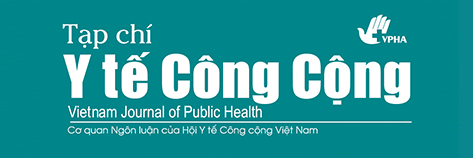Tình trạng nghiện internet ở học sinh trung học cơ sở tại thành phố Biên Hòa, tỉnh Đồng Nai (Internet addiction of secondary students in Bien Hoa city, Dong Nai province)
Tóm tắt
Nghiện internet đang là một chủ đề mới mẻ và còn nhiều bàn cãi cả trong học thuật lẫn bối cảnh lâm sàng. Nghiện internet dẫn tới nhiều hậu quả nghiêm trọng đối với cuộc sống của người nghiện, nhất là với thanh thiếu niên. Tuy nhiên, tại Việt Nam còn rất ít nghiên cứu về chủ đề này. Nghiên cứu nhằm xác định tỷ lệ nghiện internet ở học sinh trung học cơ sở (THCS) tại TP. Biên Hòa, Đồng Nai và mô tả một số đặc điểm của học sinh nghiện internet, sử dụng thiết kế nghiên cứu cắt ngang phân tích với bộ câu hỏi tự điền. Chọn mẫu cụm với cỡ mẫu là 391 học sinh trung học cơ sở (THCS) đại diện cho khối trường dân lập và công lập tại TP. Biên Hòa. Kết quả cho thấy tỷ lệ nghiện internet ở học sinh THCS là 12,3%. Học sinh nghiện internet có những biểu hiện tập trung ở việc mất kiểm soát, cảm xúc và giảm sút chất lượng học tập. Các đặc điểm liên quan đến gia đình, học lực, nguyên nhân, hậu quả của nghiện internet được phân tích trong nghiên cứu. Từ kết quả của nghiên cứu cho thấy rằng cần phải tiếp tục nghiên cứu sâu hơn về chủ đề này. Đồng thời cần phải có sự hỗ trợ từ phía xã hội, nhà trường, gia đình để giảm tình trạng nghiện internet ở học sinh. Nghiên cứu cũng đề xuất cần phải xây dựng một trung tâm chuyên biệt để can thiệp, phòng ngừa với đối tượng này.
English abstract:
Internet addiction is a new and controversial topic both academically and clinically. It had caused serious consequences in the life of the addicts, especially the youth. However, there are only a few academic reports on these topics. The aim of the present study is to conduct an investigation of internet addiction rates among secondary students in Bien Hoa city, Dong Nai province as well as to describe characteristics of them, using cross-sectional study and self-administered questionnaires. A sample size comprising of 391 secondary students representing private and public schools in Bien Hoa province was made. Data reveals that 12.3% of informants show loss of emotion control and decrease in learning performance. The research focuses on analysis of major aspects such as: family, study, causes and negative impacts of internet addiction. Research findings shows the need for conducting a further study on this topic. At the same time, supports from family, school and society are very important to reduce internet addiction in general. It is also recommended that a special center should be established for prevention and intervention of this phenomenon.
Từ khóa
Toàn văn:
PDF (English)##submission.citations##
Tiếng Việt
Hội khoa học Tâm lý - giáo dục Đồng Nai (2009). Kỷ yếu hội thảo khoa học "Nghiện Internet - game online: thực trạng và giải pháp", Đồng Nai.
Lê Minh Công (2009). Nghiện internet ở thanh thiếu niên, báo cáo qua ba trường hợp lâm sàng. (Kỷ yếu hội thảo quốc tế "Nhu cầu, định hướng và đào tạo tâm lý học đường Việt Nam), Viện Tâm lý học Việt Nam.
Lê Minh Công (2010). Phối hợp điều trị tâm lý cho một trường hợp nghiện game online. Tạp chí Tâm lý học Vol 2, Viện Tâm lý học.
Lê Minh Công (2011). Một số vấn đề lý luận và thực hành lâm sàng về nghiện internet. Tạp chí Tâm lý học, số tháng 6/2011, Viện Tâm lý học.
Nguyễn Thị Bích Hà, Hoàng Thị Xuân Dung, Trịnh Thị Quỳnh (2006). Tác động của game online tới thanh thiếu niên. Đề tài cấp ĐH Quốc Gia Hà Nội.
Tiếng Anh
Alecia C. Douglas , Juline E. Mills, et... (2008). Internet addiction: Meta-synthesis of qualitative research for the decade 1996-2006. Computers in Human Behavior 24, 3027-3044.
Allan L. Riess, et ... (2007). Gender differences in the mesocorticolimbic system during computer game-play. Standford School of Medicine, CA, USA.
Child Health Promotion Research center and Edith Cowan University (2009) Review of Existing Australian and International Cyber- Safety Research.
F. Cao and L. Su. Internet addiction among Chinese adolescents: prevalence and psychological features. Child: care, health and development, 33, 3, 275-281
Gordon M. Hart, Ph.D, et... (2009). Effects of Video Games on Adolescents and Adults. CYBERPSYCHOLOGY & BEHAVIOR Volume 12, Number 1.
Kimberly Young, Cristiano Nabuco de Abreu (2010). Internet addiction : A Handbook and guide to Evaluation and Treatment. John Wiley & Sons, Inc.
Laura Widyanto & Mark Griffiths (2006). 'Internet Addiction': A Critical Review. Int J Ment Health Addict 4: 31-51
Ma. Regina M. Hechanova and Jennifer Czinca. Internet addiction in Asia: Reality or Myth?. http://www.idrc.ca
Mark Griffiths (2008). Internet and Video - game Addiction. Adolescent Addiction: Epidemiology Assessment and treatment.
R.A. Davis (2001). A cognitive-behavioral model of pathological Internet use; Computers in Human Behavior 17, 187±195
Soo Kyung Park, et...(2009). Prevalence of internet addiction and correlations with family factors among south Korean adolescents. Family Therapy, Volume 36, Number 3.
Subramaniam Mythily, Shijia Qiu, Munidasa Winslow (2008). Prevalence and Correlates of Excessive Internet Use among Youth in Singapore. Annals Academy of Medicine Vol. 37 No. 1
Sue Fisher (1994). Identifying Video game addiction in children and adolescents. Addictive Behavors. Vol 19. No5. 545 - 553.
Yair Amichai, Hamburger (2005). The Social Net: human behavior in cyberspace. Oxford University Press.
http://www.dsm5.org



